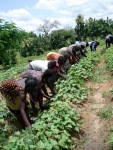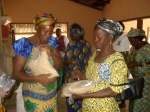If I say ‘sustainability’, what comes to your mind?
A very simple definition of sustainability would be the capacity to endure. I really like this definition.
In development, the key question of sustainability is the sustainability of the change you’re trying to create. In particular, does this change have the capacity to endure the end of the project or program.
The developing world is injected with trillions of dollars of aid every year. Is the change created by this support going to outlast the money funding it?
I’ve been ruminating over the issue of sustainability for a few days, since the project manager I’m working with made a comment that the M4P (Making Markets Work Better for the Poor) framework had a really interesting definition for sustainability. It’s a bit more wordy than the capacity to endure, but I think it captures exactly how I see the purpose of the work I’m doing:
M4P is about creating the foundation for lasting change where market systems are better equipped to respond to future needs and priorities. It acknowledges that the lives and livelihoods of the poor are continually adapting to the changing environment around them, and that the poor need solutions that adapt with them.
The M4P approach recognises that the process through which market system constraints are identified and addressed is as important as the solution itself. If the system, its functions and players, can be equipped to meet future challenges and continue to meet the changing needs of the poor then impact is sustained, rather than short-lived or dependent on further injections of aid.
I don’t imagine many people would disagree with the definition. The real debate comes in when one person or project declares “Yes! What I’m doing is sustainable!” and another person disagrees and asks, “Ummm… Are you sure?” For example…
The other day, a facebook friend and old classmate at Carleton posted about a visit to Bonsaaso, Ghana, the site of a Millennium Village. He commented that the village produced $7M USD of cocoa last year, and congratulated the village on sustainability. My assumption here is that he’s congratulating the Millennium Villages project for sustainability, and my first reaction was, “Ummm… Are you sure?”
What evidence is there in the figure of $7M USD that shows sustainability? Of anything, let alone the Millennium Villages project. If we break it down a little, it amounts to $0.55USD per person per day (taking the population of 35,000 as stated in the MV website, and making a huge assumption that every person would benefit equally from this income). Farmers in this area are undoubtedly growing other crops and cocoa is not their sole source of income, but regardless, the amount is small. I have no issues with cash crop production. And I absolutely think that improving marketing opportunities for farmers is the way forward with regards to agricultural development. Hence why this is what I do!
But my question about sustainability is this: what exactly about this $7M USD of cocoa production is attributable to the MV project? More importantly, what actors are in place in the system to ensure that this production continues and grows after the MV funding leaves Bonsaaso– and what of that is attributable to the MV project? (A bigger question would even be what, exactly is the MV project doing in Bonsaaso? Their website certainly doesn’t tell me clearly!)
The basic idea behind the MV project is that if you throw a lot of aid money at a village, and ensure a lot of government and citizen involvement, then you’ll see results. Well, that sounds novel. But I question how much the effects of MV intervention will really be sustained, when the money and the push pull out. In fact, a lot of people question this. As seen here. And here. And here.
(Although maybe we’ll be lucky and Tommy Hilfiger will sell enough t-shirts to continue funding the MV project, the MV project can continue funding villages indefinitely, and the question of sustainability won’t matter.
So if I go back to the M4P definition of sustainability, the question is about the process through which constraints were identified and addressed. Surely, in a future vision of Bonsaaso, there are market actors competing and upgrading to improve opportunities for farmers in the cocoa market. Inputs suppliers should be supplying appropriate fertilizers, agrochemicals, saplings, etc. Farmers should have knowledge of the agronomic best practices, the knowledge of their various marketing opportunities, and the knowledge of how to upgrade quality and volumes to get better prices. Transportation providers, traders, and processors should be working toward building mutually beneficial and profitable relationships with farmers and other market actors. The question is about how the MV project is going about engaging these actors in the system, to ensure that its functions and players, can be equipped to meet future challenges and continue to meet the changing needs of the poor.
If I could see documentation of the process through which these actors were engaged, and see a proper impact assessment after the life of the intervention that demonstrates that as a result of the MV project, the actors in the system are better equipped the meet the future challenges and changing needs of the cocoa farmers of Bonsaaso, then I would believe in the sustainability of the Millennium Villages project.
I constantly question whether the change the project I’m working with will ultimately have the capacity to endure, but I’d have to question myself if I wasn’t questioning it. I feel confident in the approach it takes to engaging the appropriate actors in the system to make the change. The Market Facilitation approach (in many respects similar to the M4P approach) is concerned with the process of creating change with and through market actors, to ensure that the right players have the right skills and incentives to constantly respond to the changing needs of the system.
I believe this kind of systemic approach is the only way to achieve sustainable change through development interventions – change that has the capacity to endure.

